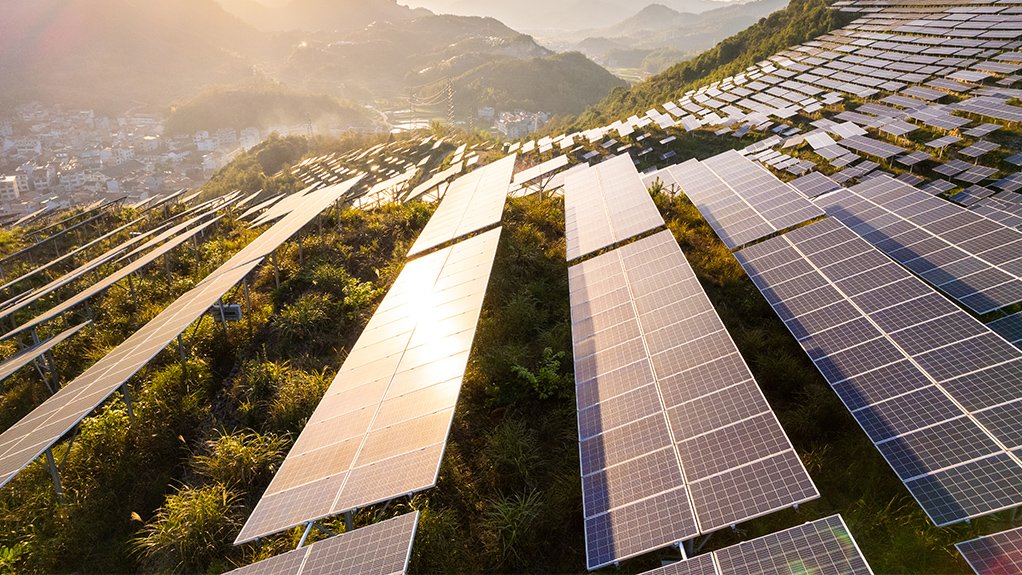Decarbonised economy requires diverse approach


DECARBONISED FUTURE Stakeholders need to consider more than renewable energy for a decarbonised economy
A decarbonised economy requires not only investment in renewable energy, but also exploring and integrating other options to decarbonise industrial processes that comprise about 75% of total carbon emissions, says financial advisory services company Cresco Group senior associate Dominic Goncalves.
Although most of the focus is on renewable-energy sources when trying to reduce carbon emissions, electricity production comprises a small portion of carbon emissions associated with industrial processes.
Therefore, the integration of renewable-energy sources alone will not equate to a decarbonised economy, he adds.
Goncalves explains that the key to a decarbonised economy is to reduce emissions in everything that is produced and consumed through viable solutions.
“Renewable-energy has become cheaper than fossil fuels, so in this case, switching to a cleaner option can also result in cost savings. It is hoped that the cost of switching to decarbonised options in other areas will follow this same trajectory, as we scale up and commercialise more decarbonisation solutions.”
Prioritised focus on renewable energy is largely owing to renewable energy sources, such as wind and solar, which are available. However, the technology to store energy from these sources is limited and in most cases can meet only about 50% to 60% of electricity consumption needs. This results in companies’ continuing to rely on fossil fuels as back up or supplementary power sources when wind or solar power is not available.
“To get the emissions out of those fossil fuels or emissions out of our load – following or backup power, we need technologies such as green hydrogen, and long duration storage,” says Goncalves.
However, companies must contend with high prices for green hydrogen, which are likely to continue for at least the next five to ten years while green hydrogen and other long duration battery storage solutions are still being developed.
Further, challenges such as inflation, supply chain costs and recessions are likely to extend the period until such options are viable.
Goncalves adds that long duration storage as a solution is less hyped, compared to green hydrogen, but is equally viable as a solution, which should be investigated in more detail.
Offsetting the Negative
He explains that while stakeholders continue to invest in and integrate renewable energy, they should also consider avenues to reduce, mitigate and remove carbon from their production processes.
One such avenue is nature-based solutions, such as regenerative agriculture and carbon offset initiatives, which can mitigate or sequester carbon, provided they are developed properly and managed properly, says Goncalves.
Carbon offset refers to a reduction or removal of carbon dioxide emissions or other greenhouse gases to compensate for emissions created elsewhere.
Previously, the focus was on solutions that provided clean energy; currently, the focus is on climate solutions, of which clean energy is an aspect, along with other solutions that can effectively mitigate more carbon.
Goncalves says there are simple approaches and solutions to mitigating carbon that are often “shut down for the wrong reason”.
During conferences, such as the United Nations Climate Change Conference, there are common themes of greenwashing, as well as greenwashing accusations.
Greenwashing refers to when companies market their products or processes as being environmentally sustainable, or green, to appeal to consumers. However, the marketing is misleading as the product or process is not as sustainable as advertised – and in some cases, more harmful.
He adds that while it is critical for stakeholders to hold one another accountable, there are also a significant number of solutions that are shut down in a similar manner without evaluating their true impact.
Companies have faced criticism and greenwashing allegations when pursuing carbon offset initiatives, such as regenerative agriculture and other nature-based solutions, which affordably sequestered carbon in the soil.
Companies can then develop carbon credits when doing so. But such practices have been criticized, adds Goncalves.
“A lot of the accusations on greenwashing are saying that ‘you need to focus on getting rid of all the technology-based emissions before you try and offset’. But the problem companies face is that you can’t get rid of all the technology-based emissions right now, because the technology for storage, hydrogen and zero-carbon industrial processing – for steel and cement among others¬– is not there yet.”
Goncalves explains that the current trend is to maximise the amount of technology-based emissions reduction that is possible now, and “gear this up” as the decarbonisation technologies continue to develop over the next five to ten years.
He explains that companies can either “just wait” at this point or invest in nature-based solutions in the meantime to enhance their emissions reduction while the technologies are developed to a level of providing 100% reliable, zero-carbon electricity.
It is better for companies to use carbon offsets until new technology is developed to meet the requirements of renewable energy and decarbonised processes as opposed to doing nothing and potentially continuing to negatively impact the environment.
He adds that while carbon offset initiatives do not generate energy, it can reduce emissions and can have other benefits such as job creation. Initiatives can also be developed using profit models that can increase cost savings for companies.
“We would urge companies and governments to look at these newer approaches that are able to achieve really good results for affordable investment.”
Goncalves notes that there are teething problems in developing accurate methods to effectively monitor and validate carbon mitigation and offsets.
However, it’s continual use and development enables stakeholders to learn and work towards methods that will achieve the effectiveness required.
“It is quite complex, but we have become more wiser to what can be done in the past few years, tying together multiple things to enhance or optimize results.”
He elaborates that in order to truly address climate change and the biodiversity crises, stakeholders need to expand on the quantity, quality and type of solutions.
“Replacing fossil fuels with clean energy has been an important first step and is well underway; we now need to address carbon emissions in more ‘harder to abate’ sectors of industry, and also protect and expand nature, which can also be used as a solution to mitigate, reduce and sequester carbon. Multiple strategies are needed to reduce the risk of catastrophic damage caused by global warming,” he concludes.
Comments
Press Office
Announcements
What's On
Subscribe to improve your user experience...
Option 1 (equivalent of R125 a month):
Receive a weekly copy of Creamer Media's Engineering News & Mining Weekly magazine
(print copy for those in South Africa and e-magazine for those outside of South Africa)
Receive daily email newsletters
Access to full search results
Access archive of magazine back copies
Access to Projects in Progress
Access to ONE Research Report of your choice in PDF format
Option 2 (equivalent of R375 a month):
All benefits from Option 1
PLUS
Access to Creamer Media's Research Channel Africa for ALL Research Reports, in PDF format, on various industrial and mining sectors
including Electricity; Water; Energy Transition; Hydrogen; Roads, Rail and Ports; Coal; Gold; Platinum; Battery Metals; etc.
Already a subscriber?
Forgotten your password?
Receive weekly copy of Creamer Media's Engineering News & Mining Weekly magazine (print copy for those in South Africa and e-magazine for those outside of South Africa)
➕
Recieve daily email newsletters
➕
Access to full search results
➕
Access archive of magazine back copies
➕
Access to Projects in Progress
➕
Access to ONE Research Report of your choice in PDF format
RESEARCH CHANNEL AFRICA
R4500 (equivalent of R375 a month)
SUBSCRIBEAll benefits from Option 1
➕
Access to Creamer Media's Research Channel Africa for ALL Research Reports on various industrial and mining sectors, in PDF format, including on:
Electricity
➕
Water
➕
Energy Transition
➕
Hydrogen
➕
Roads, Rail and Ports
➕
Coal
➕
Gold
➕
Platinum
➕
Battery Metals
➕
etc.
Receive all benefits from Option 1 or Option 2 delivered to numerous people at your company
➕
Multiple User names and Passwords for simultaneous log-ins
➕
Intranet integration access to all in your organisation



















